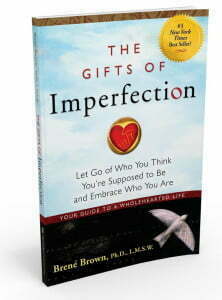If so, you are not alone. I have been following researchers like Brene Brown who talk about the incredible pressures we place on ourselves to be a ‘perfect parent’, ‘perfect employee’ – to have a ‘perfect relationship’ and a ‘perfect body’. Our endless pursuit of perfection can contribute to anxiety, depression and a sense that we are constantly failing. As Brene says:
Perfectionism is defeating and self-destructive simply because there is no such thing as perfect. Perfection is an unattainable goal. Additionally, perfectionism is more about perception – we want to be perceived as perfect. Again, this is unattainable – there is no way to control perception, regardless of how much time and energy we spend trying.
This week I came across an article written by Jason Zook who talks about how perfectionism can paralyse us and stop us from doing anything. He believes that there is no such thing as a perfect idea, process or strategy. By chasing the perfect anything, we ride what he calls the ‘Ferris wheel of perfection’, where as soon as you reach the end, a new set of problems arise and you continue going around in a never-ending circle.

Steve Achor echoes these words in his great TED Talk about the ‘Happy secret to better work’, in which he shows how in our society we are never satisfied, once we achieve something we change the goal posts so that we have to do more – better, smarter and faster.
For myself I have to admit that as I have got older and, I like to believe wiser, I no longer strive for perfection. I do my absolute best and always try my hardest, but I accept that I am not perfect, and that my work is not perfect and, importantly, that this is okay. I agree with Jason who says that:
If you can reframe your thinking from perfection to completion, you’re sure to accomplish much more. Don’t worry about finishing a task in the perfect way, focus on finishing the task. The pursuit of perfection most often only leads to procrastination and avoidance. Instead of looking for perfection, trust your gut and listen for things that feel right. We often dismiss our intuition in our unrealistic pursuit of perfection.
These days I try to accept that I am not perfect, I feel grateful for what I have, and I try to focus on what the ARRC can do with the resources, people and opportunities available to us. I hope that if you are reading this you might join me in my ‘imperfectionism’ and encourage others to do the same. If you are interested in reading more, Brene Brown’s book The Gifts of Imperfection is a must read.
Siwan 🙂


